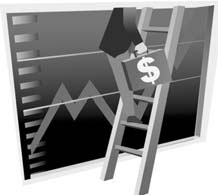 It was a rare moment, sitting among about 100 young reporters mainly from media in the Pearl River Delta, listening to a talk by Wang Shi, probably the largest property developer on the Chinese mainland, focusing on the "bursting" of the economic bubble. It was a rare moment, sitting among about 100 young reporters mainly from media in the Pearl River Delta, listening to a talk by Wang Shi, probably the largest property developer on the Chinese mainland, focusing on the "bursting" of the economic bubble.
He did not give a time frame, but said, emphatically, that the present near frenzy in stock and property investment, is not sustainable, and will one day come to the point of explosion or find other ways to release internal pressure. One does not usually encounter a leading entrepreneur expressing such views on macro-economics. But Wang is not alone. Many economists have argued that China is in the middle of a great change that will lead to a very different way of development. Even most stock traders would have to agree. They have, out of a sense of urgency, been rushing to invest in the market. At the start of the year, almost 300,000 new trading accounts were being opened in a week. This has led to China's total retail investors' accounts to exceed 100 million. Their time frame is also very short. It is only between now and the third quarter of 2008, when the Beijing Olympics closes. They know - as a Chinese saying goes, there is no party that lasts forever. They are grabbing whatever there is on the table at the moment. They believe they have made the right decision, although their way of reasoning is totally against economic logic. They think central government officials cannot afford to lose face with a major stock market plunge when the Games are just around the corner. totally against economic logic. They think central government officials cannot afford to lose face with a major stock market plunge when the Games are just around the corner. Of course, no government deliberately tries to dampen investors' enthusiasm. Investors got hurt seven years ago, but that was because the government was inexperienced in managing the capital market - and the market economy as a whole. However, stock traders are mistaken in thinking that the government will manage the market primarily for political reasons - like how to look good during the Olympics. The government will not offer them simple protection, even less any pledge on financial returns. The best thing is not to "talk down" the stock market when it appears too bullish, and to "talk up" the market next day when some investors have incurred heavy losses. The government should avoid sending messages that may give investors the impression that there are officials checking their grudging blogs from time to time, and are sympathetic over their losses. This is not the way to run a benevolent government, much less a responsible one for the long-term interests of the public. Now, when thinking people are talking about post-bubble scenarios while retail investors continue to harbor wishful thoughts of earning profit on whatever stocks they buy, economic policymakers will have come to an ultimate decision: Pamper the insatiable appetites of investors and keep the party going. Or for the sake of China's long-term health, take reasonable action to prick the small bubbles before they grow into large ones - and forget about the Olympics. E-mail: younuo@chinadaily.com.cn (China Daily 06/25/2007 page4)
|

